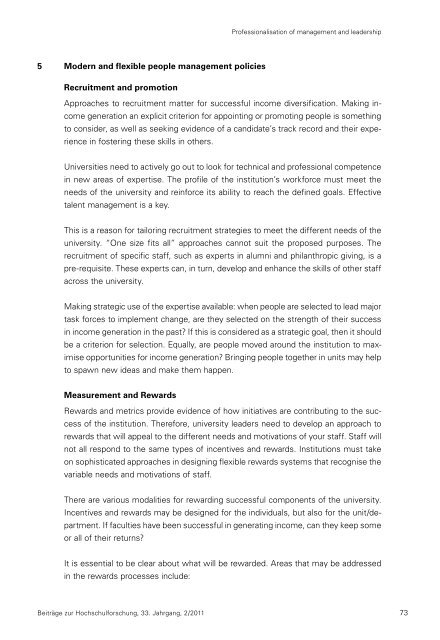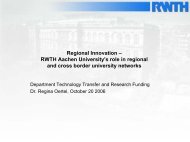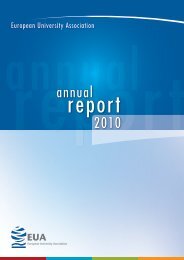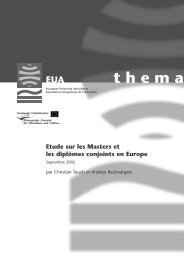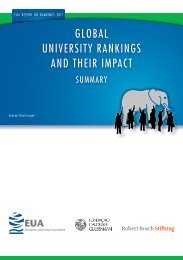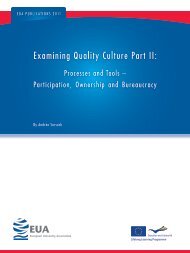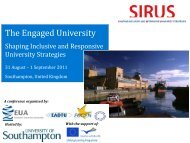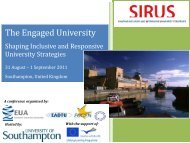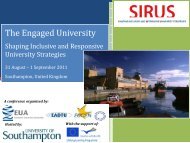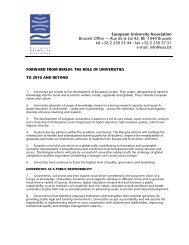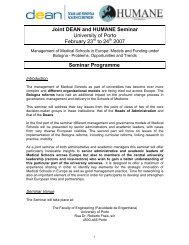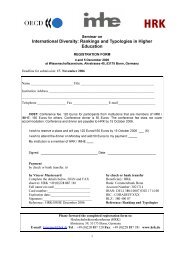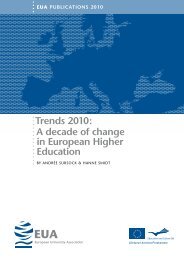Beiträge zur Hochschulforschung - European University Association
Beiträge zur Hochschulforschung - European University Association
Beiträge zur Hochschulforschung - European University Association
You also want an ePaper? Increase the reach of your titles
YUMPU automatically turns print PDFs into web optimized ePapers that Google loves.
5 Modern and flexible people management policies<br />
Recruitment and promotion<br />
Professionalisation of management and leadership<br />
Approaches to recruitment matter for successful income diversification. Making in-<br />
come generation an explicit criterion for appointing or promoting people is something<br />
to consider, as well as seeking evidence of a candidate’s track record and their expe-<br />
rience in fostering these skills in others.<br />
Universities need to actively go out to look for technical and professional competence<br />
in new areas of expertise. The profile of the institution’s workforce must meet the<br />
needs of the university and reinforce its ability to reach the defined goals. Effective<br />
talent management is a key.<br />
This is a reason for tailoring recruitment strategies to meet the different needs of the<br />
university. “One size fits all” approaches cannot suit the proposed purposes. The<br />
recruitment of specific staff, such as experts in alumni and philanthropic giving, is a<br />
pre-requisite. These experts can, in turn, develop and enhance the skills of other staff<br />
across the university.<br />
Making strategic use of the expertise available: when people are selected to lead major<br />
task forces to implement change, are they selected on the strength of their success<br />
in income generation in the past? If this is considered as a strategic goal, then it should<br />
be a criterion for selection. Equally, are people moved around the institution to max-<br />
imise opportunities for income generation? Bringing people together in units may help<br />
to spawn new ideas and make them happen.<br />
Measurement and Rewards<br />
Rewards and metrics provide evidence of how initiatives are contributing to the suc-<br />
cess of the institution. Therefore, university leaders need to develop an approach to<br />
rewards that will appeal to the different needs and motivations of your staff. Staff will<br />
not all respond to the same types of incentives and rewards. Institutions must take<br />
on sophisticated approaches in designing flexible rewards systems that recognise the<br />
variable needs and motivations of staff.<br />
There are various modalities for rewarding successful components of the university.<br />
Incentives and rewards may be designed for the individuals, but also for the unit/de-<br />
partment. If faculties have been successful in generating income, can they keep some<br />
or all of their returns?<br />
It is essential to be clear about what will be rewarded. Areas that may be addressed<br />
in the rewards processes include:<br />
<strong>Beiträge</strong> <strong>zur</strong> <strong>Hochschulforschung</strong>, 33. Jahrgang, 2/2011 73


